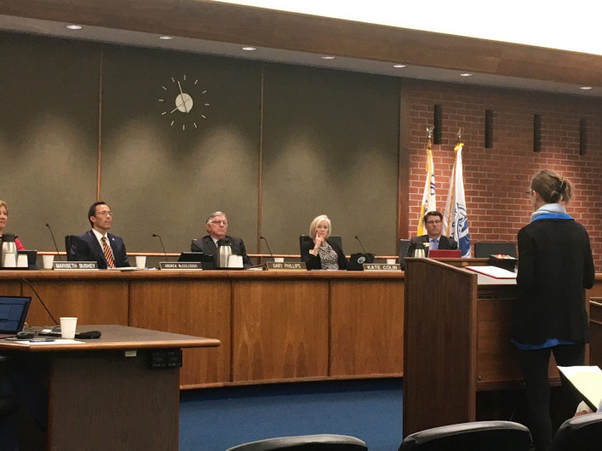 Caroline Peattie, executive director of the Fair Housing Advocates of Northern California, urges the San Rafael City Council to adopt a rental discrimination ordinance during the council’s Monday evening meeting at City Hall in San Rafael, Calif. on Oct. 1, 2018. Peattie was one of 10 public speakers who advocated for the ordinance, which would prohibit renters from disqualifying prospective renters based solely on the fact that they use a Section 8 housing voucher. (Will Houston/Marin Independent Journal) San Rafael may join other Marin County communities in prohibiting landlords from discriminating against prospective tenants who use Section 8 housing vouchers. The City Council met Monday to provide feedback to staff and hear input from the public as the city works to develop an ordinance based on similar fair housing rules passed in Fairfax, Novato and by the Marin County Board of Supervisors. The council could have taken up the ordinance for a public hearing as soon as Oct. 15, but instead directed staff to bring back more information. “We want to do this right,” Mayor Gary Phillips said. San Rafael’s proposed ordinance would make it illegal for property owners to discriminate against prospective tenants, to add extra conditions into a lease agreement that make it more difficult for them to be housed and denying tenants services based on their source of income. Landlords can still screen tenants based on factors like credit score, rental history and references, said Andrew Hening, the city’s homeless planning and outreach director. The ordinance does not apply to security deposits.
The county, which adopted its rules in 2016, has called on other communities to follow suit in order to create uniform protections throughout the county. State law does have anti-discrimination protections in place for tenants, but those do not cover Section 8 housing vouchers. Hening said between 2014 and 2016 about half of the county’s nearly 2,200 voucher holders weren’t able to find landlords willing to accept vouchers, which resulted in them losing their vouchers. That’s an issue, he said, when 48 percent of San Rafael’s nearly 23,000 households are rentals. The result, Hening said, has been “deeper structural inequities in the housing market.” “The housing choice voucher was designed to help people move out of areas of concentrated poverty into other areas,” Hening said during Monday’s City Council meeting. “And so you can imagine that if there is a more affluent community that has a better school district, for example, being able to move your family to that district can be very important to long-term economic outcomes for that family.” But that has not been the result overall, Hening said. While he did not have similar data for Marin County, Hening said other Bay Area communities like Oakland have minority populations residing in the same areas of the city they were located in nearly 80 years ago. Citing data from the Marin Housing Authority, David Levin of Legal Aid of Marin said about 17 percent of Marin County’s voucher holders are black and about 37 percent are disabled. He said this is disproportionate compared to the county’s census data, which shows the population being 2 percent black and about 9 percent disabled. Many San Rafael City Council members spoke in favor of the proposed ordinance, but also raised concerns about potentially inhibiting what little affordable housing development there is in the city — specifically the construction of accessory dwelling units sometimes referred to as mother-in-law units. “We wouldn’t want to take action here and have unintended consequences flow from that action,” said Councilman Andrew McCullough, who raised the issue at Monday’s meeting. The thought of removing accessory dwelling unit rentals from these discrimination protections did not sit well with Caroline Peattie, executive director of the Fair Housing Advocates of Northern California. “These smaller units are more likely to be affordable in the first place, so why would we want to take that off the market?” Peattie asked. “And why would we want to allow certain people and not others the right to discriminate?” One proposal was to include an exception for accessory dwelling units in cases where the owner or a member of the landlord’s family occupies the same rental space and shares the kitchen and bathroom with the renter. Hening said this exception was originally included in Marin County’s ordinance, but was later removed because it was too vague. The council directed staff to research the city’s stock of these accessory dwelling units and to come back with more information at a future meeting. Other concerns raised were how enforceable the rules would be and whether some of the penalties were too harsh. Councilman John Gamblin questioned how they would be able to tell whether a landlord had discriminated against a voucher holder. “It is a little bit of a gray area sometimes,” Hening said in response. Councilwoman Maribeth Bushey said she was concerned about the ordinance penalizing violators with a civil fine of up to three times the rent of the unit. She was also concerned about the potential for violators to be charged with a misdemeanor with penalties of up to $1,000 in fines and six months in jail. “I’m not sure that creating that type of an enforcement mechanism is consistent with our overall objective of making this expansive and attracting landlords into the program,” Bushey said. “It would only take one aggressive attorney to start filing these cases to have this whole thing crumble down around us.” The proposal garnered broad support from the public — from lawyers to housing advocates to the disabled community — at the meeting, who saw it as a necessary action to stem ongoing discrimination. No one spoke in opposition to the ordinance. Some called for the city to take further steps such as adopting mandatory mediation rules for rent increases and a “just cause” eviction ordinance similar to the one Marin County is reviewing. Peter Mendoza, the director of advocacy and special projects at the Marin Center for Independent Living, said the majority of their clients come to the center for housing issues, with some losing their housing subsidies because they can’t find housing. A disabled resident himself, Mendoza said he was once a housing voucher holder and was able to move into an apartment, which he said allowed him to be as far as he is today. “It’s a really important bridge in our community toward independence,” Mendoza said. “And it’s really important that everyone who is trying to make their life better and have stable housing and to be able to work and be active in the community have a chance and opportunity to do that.”
0 Comments
Leave a Reply. |
|
|

TDD: (800) 735-2922
Se habla español We welcome our site visitors with content in Spanish and Vietnamese. En Espanol TIẾNG VIỆT |
|

